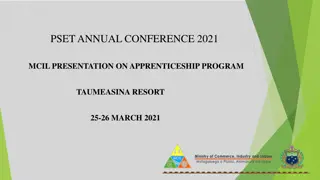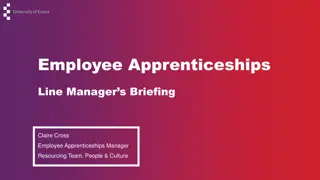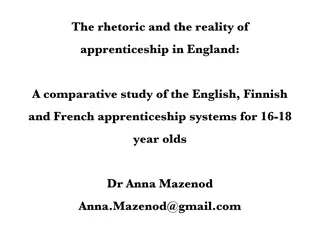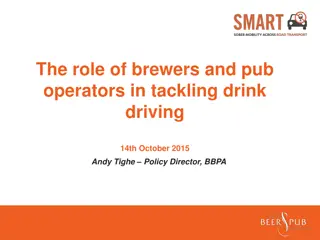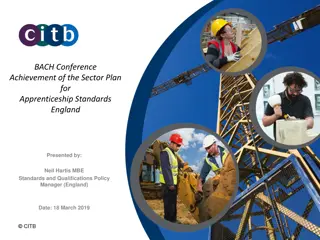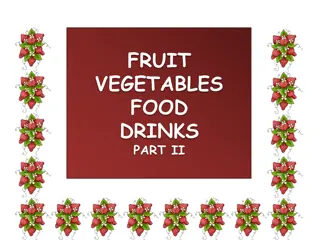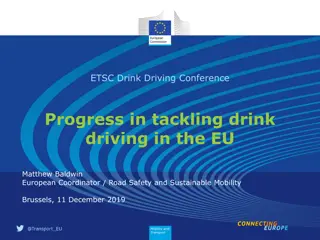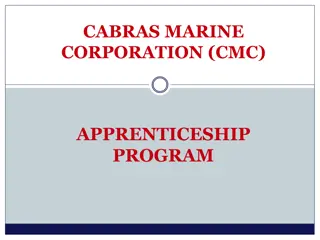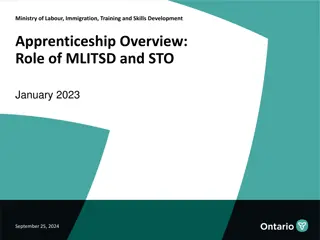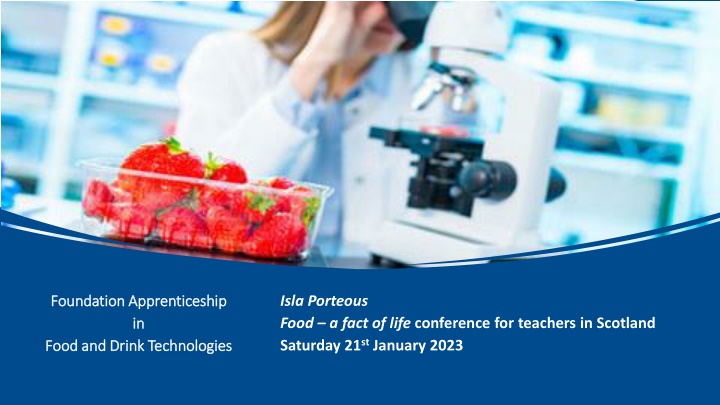
Foundation Apprenticeships in Food and Drink Technologies in Scotland
Foundation Apprenticeships (FAs) in Food and Drink Technologies prepare young people for careers in the sector by providing necessary skills and knowledge. The program includes a balance of taught elements and work-based competences, offering a valuable vocational pathway for senior-phase pupils. Completion leads to qualifications recognized by several universities in Scotland.
Download Presentation

Please find below an Image/Link to download the presentation.
The content on the website is provided AS IS for your information and personal use only. It may not be sold, licensed, or shared on other websites without obtaining consent from the author. If you encounter any issues during the download, it is possible that the publisher has removed the file from their server.
You are allowed to download the files provided on this website for personal or commercial use, subject to the condition that they are used lawfully. All files are the property of their respective owners.
The content on the website is provided AS IS for your information and personal use only. It may not be sold, licensed, or shared on other websites without obtaining consent from the author.
E N D
Presentation Transcript
Isla Porteous Food a fact of life conference for teachers in Scotland Saturday 21st January 2023 Foundation Apprenticeship Foundation Apprenticeship in in Food and Drink Technologies Food and Drink Technologies
What are Foundation Apprenticeships (FAs)? What are Foundation Apprenticeships (FA s)? This prepares young people for direct entry into a career in the food and drink sector by equipping them with the necessary skills and knowledge to work effectively from day one of employment. A Foundation Apprenticeship is about the right balance between delivering taught elements of the programme (the NPA) and the development of work-based competences. A Foundation Apprenticeship is designed for senior- phase pupils they can choose to study a FA in S5 or S6, and it can last one or two years. Foundation Apprenticeships highlight that there are meaningful vocational pathways as challenging and valuable alternatives to existing academic subjects. Young people spend time out of school with a local employer, and complete the Foundation Apprenticeship alongside their other subjects like National 5 s and Highers. Completion leads to a qualification at the same level of learning as a Higher and can lead to progression on to a job, such as a Modern or Graduate Apprenticeship.
Qualification Recognition Qualification Recognition Currently the Foundation Apprenticeship (FA) in Food and Drink Technologies is recognised at the following Universities in Scotland University Recognition of FA in Food and Drink Technologies 1 Higher A, 2 Highers B Abertay University Edinburgh Napier University 1 Higher A Glasgow Caledonian University Heriot Watt University 1 Higher A 1 Higher A Open University Open Recognition 1 Higher A, 2 Highers University of Highlands and Islands The university offers enhanced recognition if applying for a degree in the same subject area
Key information to consider: Key information to consider: There is certain criteria that needs to be met a certain times of the year in order to get the funding, each authority has a Partnership and Delivery Manager and a Contract and Partnership Advisor who work closely with the FA lead in your authority. Foundation Apprenticeships are delivered by partnerships comprised of school, learning provider, and employer. Foundation Apprenticeships are funded by Skills Development Scotland The learning provider is responsible for the approvals, delivery, assessment and quality assurance of the component units and qualifications. The learning provider must have the appropriate SQA centre and qualification approvals in place before it can deliver the Foundation Apprenticeship. Where multiple learning providers are involved, arrangements between them will be detailed in an SQA Partnership Agreement.
Food and drink manufacturing is Scotland s largest manufacturing sector It employees approximately 47,000 employees Why study a Foundation Apprenticeship (FA) in Food and Drink Technologies? Scottish Food and Drink Manufacturing will need approximately 6,700 new recruits between 2021-2031 There are approximately 1185 food manufacturing businesses in Scotland We need to make sure young people are aware of the positives of working in the industry examples of which there are plenty, some examples outlined below: We need to try and make the industry attractive to young people by helping them to understand the range of challenging and rewarding careers, covering a whole range of areas There are opportunities for those with all levels of qualifications A fast paced environment which is constantly changing to keep up with consumer demands Opportunities for career development are huge So by studying the FA in Food and Drink Technologies we are able to show and give young people the real life experience of working in the food and drink manufacturing industry. WE WILL ALWAYS NEED FOOD.
Overview of a Foundation Apprenticeship in Overview of a Foundation Apprenticeship in Food and Drink Technologies Food and Drink Technologies It comprises of: A National Progression Award (NPA) in Food Manufacturing at SCQF level 6 Awards in Health & Safety and Food Hygiene at SCQF level 5 Core units of an SVQ in Food and Drink Operations at SCQF level 6 A substantial work placement in person or virtual. All assessed coursework No externally assessed Exam A Foundation Apprenticeship in Food and Drink Technologies, is the same level of learning as an SQA Higher (SCQF level 6).
Overview of the National Progression Award (NPA) in Food Manufacture Overview of the National Progression Award (NPA) in Food Manufacture at SCQF level 6 at SCQF level 6 The NPA aims to develop an understanding of the principles, structure, processes and procedures used in the food and drink manufacturing industry. This is achieved by: Developing a basic working knowledge of food and drink manufacturing as required by employers. Developing knowledge of relevant legislation and how this impacts on the food and drink manufacturing industry. Developing awareness of the commercial and social drivers that affect the food and drink manufacturing industry. Developing an understanding of how sustainability issues affect the food and drink manufacturing industry locally and on a global scale.
National Progression Award (NPA) in Food Manufacture at SCQF level 6 There are four mandatory units in the NPA Food Manufacture these are: Food Manufacturing: Fundamentals of Food Science This unit gives an overview of the science and legislation underpinning the food and drink manufacturing industry. Food Manufacturing: Food Production This unit gives an overview of the structure of the food and drink manufacturing industry from field to table . Food Manufacturing: Commercial and Social Drivers This unit gives you overview of the influence of the economic climate and social attitudes on the food and drink manufacturing industry. Food Manufacturing: Sustainability This unit enables the candidate to research and make an informed evaluation of the sustainability of the agricultural procedures and manufacturing processes involved in the food and drink manufacturing industry.
NPA Food Manufacture Approaches to Delivery and Assessment Where possible, learning for all four units should occur through interaction with others, undertaking activities and through the building of a portfolio of outcomes and evaluations from each unit. Candidates may benefit from: working in small research groups a basic knowledge of science based subject (this is not essential) presenting their findings to the class, either individually or as a group class discussion of findings working individually to produce portfolios research activities to locate and analyse information online visits from those involved in the food and drink manufacturing industry (eg manufacturing professionals, environmental health officers or local producers)
Overview of Work Based Learning It is suggested that pupils will ideally have the opportunity to undertake 2 different placements. The placements must be with food and drink employers and not a simulated placement like a school or college laboratory these currently can be a blend of in person placements or a virtual approach. It would be good if you had one or two local employers who you could work closely with for placement activity. You need to have an approved assessor to assess this element of the course, with the relevant experience in the area of food and drink manufacturing the young person is carrying out their placement in.
Work Based Learning Candidates are expected to complete the following units: DEVELOP PRODUCTIVE WORKING RELATIONSHIPS WITH COLLEAGUES INTERPRET AND COMMUNICATE INFORMATION AND DATA IN FOOD AND DRINK OPERATIONS CONTRIBUTE TO CONTINUOUS IMPROVEMENT OF FOOD SAFETY IN FOOD AND DRINK OPERATIONS DEVELOP A NEW PRODUCT IN A FOOD BUSINESS PROMOTE AND SUPPORT CREATIVE THINKING IN A FOOD BUSINESS Candidates must be able to demonstrate knowledge and understanding for each of the units as well being able to evidence the performance criteria for each of the units.
Examples of Workplace Activities: WORKING WITH COLLEAGUES AS PART OF A TEAM IN FOOD/DRINK PRODUCTION AREAS, WHICH COULD INCLUDE VIRTUAL COMMUNICATIONS, WALK-THROUGHS, VIDEO FOOTAGE, EXPERT Q&AS CHECKING THAT STOCK HAS BEEN REORDERED AND DOCUMENTATION COMPLETED AND SHARED WITH RELEVANT STAFF (ACCOUNTS, GOODS- IN ETC) CHECKING RECIPES ARE CORRECT AND CALCULATING QUANTITIES AND CHECK WITH SUPERVISOR CHECKING FINISHED PRODUCTS ARE LABELLED CORRECTLY AND STORED CORRECTLY (CHILLED, FREEZER ETC) CHECKING FOR CONTAMINATION/DA MAGE IN SUPPLIES (HOLES IN BAGS, BASHED TINS ETC.) AND REPORT ACCORDING TO COMPANY PROCEDURES WORKING THROUGH A PRODUCT DEVELOPMENT TASK LISTENING, SHARING AND CONTRIBUTING TO IDEAS PRESENTED BY COLLEAGUES AND TEAM MEMBERS IN A POSITIVE WAY AND AT AN APPROPRIATE TIME AND PLACE ATTENDING TEAM MEETINGS TO DISCUSS ORGANISATIONAL DEVELOPMENT, STRATEGY AND OBJECTIVES AND CONTRIBUTING OWN IDEAS
Examples of how Evidence can be gathered: LEARNER NOTES OF MEETING AND POINTS DISCUSSED RECORDINGS OF WITNESS TESTIMONY BY ASSESSOR/MENTOR/SUPER VISOR INDICATING: PERSONAL STATEMENT OF OWN CONTRIBUTIONS TO THE MEETING SIGNED BY TEAM LEADER/SUPERVISOR NOTES ON NEW STANDARDS AND PROCEDURES OR PERSONAL STATEMENT SIGNED BY SUPERVISOR FEEDBACK ON PERFORMANCE FROM SUPERVISOR/MENTOR COPIES OF RECORDS OR DOCUMENTS COMPLETED BY THE LEARNER RECORDINGS WHERE APPROPRIATE WRITTEN EVIDENCE





